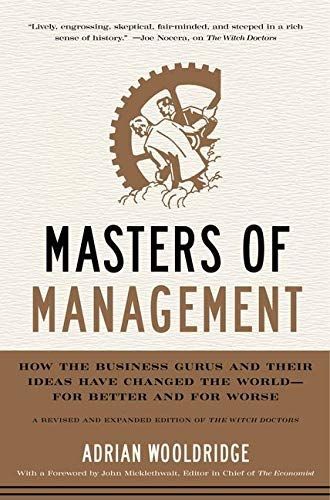
Masters of Management How the Business Gurus and Their Ideas Have Changed the World—for Better and for Worse
In 1996, having completed a two-year research study, longtime Economist journalists and editors John Micklethwait and Adrian Wooldridge published The Witch Doctors, an explosive critique of management theory and its legions of evangelists and followers. The book became a bestseller, widely praised by reviewers and devoured by readers confused by the buzzwords and concepts the management “industry” creates. At the time, ideas about “reengineering,” “the search for excellence,” “quality,” and “chaos” both energized and haunted the world of business, just as “the long tail,” “black swans,” “the tipping point,” “the war for talent,” and “corporate responsibility” do today. For decades, since the rise of MBA programs on campuses across the country, the field of management has operated in a dubious space. Many of its framers clamor for respect within the academy while making millions of dollars pedaling ideas, some brilliant and some nonsensical, in speeches, consulting arrangements, and books. Although The Witch Doctors was a damning critique (“a scalpel job,” according to the Wall Street Journal), it also argued that much of management theory is valuable—making companies more effi-cient and productive, improving organizational life for workers, and providing sound ways for companies to innovate while defending more entrenched plans. Building upon all that made the original such a phenomenal success, this fully revised and updated edition, Masters of Management, takes into account the rise of the Internet, the growing power of emerging markets, the Great Recession of 2008, and the more recent developments in management theory. The result is an indispensable volume for any manager.
Reviews
Lance Willett@lancewillett
Katie Day@librarianedge